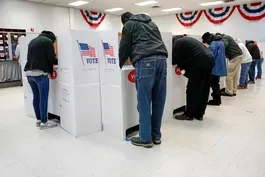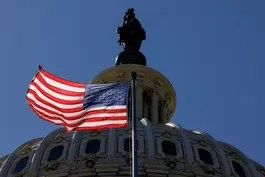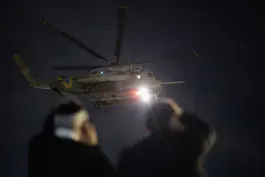
Mothers of Palestinian students shot in Vt. discuss recovery
Clip: 11/29/2023 | 8m 36sVideo has Closed Captions
Mothers of Palestinian students shot in Vermont discuss recovery and possible motive
The shooting of three young men of Palestinian descent by a white man in Burlington, Vermont, has again stirred fears of rising Islamophobia and anti-Arab hatred. William Brangham spoke with two of the victims' mothers about their recovery and the possible motives for the attack.
Problems with Closed Captions? Closed Captioning Feedback
Problems with Closed Captions? Closed Captioning Feedback
Major corporate funding for the PBS News Hour is provided by BDO, BNSF, Consumer Cellular, American Cruise Lines, and Raymond James. Funding for the PBS NewsHour Weekend is provided by...

Mothers of Palestinian students shot in Vt. discuss recovery
Clip: 11/29/2023 | 8m 36sVideo has Closed Captions
The shooting of three young men of Palestinian descent by a white man in Burlington, Vermont, has again stirred fears of rising Islamophobia and anti-Arab hatred. William Brangham spoke with two of the victims' mothers about their recovery and the possible motives for the attack.
Problems with Closed Captions? Closed Captioning Feedback
How to Watch PBS News Hour
PBS News Hour is available to stream on pbs.org and the free PBS App, available on iPhone, Apple TV, Android TV, Android smartphones, Amazon Fire TV, Amazon Fire Tablet, Roku, Samsung Smart TV, and Vizio.
Providing Support for PBS.org
Learn Moreabout PBS online sponsorshipGEOFF BENNETT: Now we turn the aftermath of the shooting that happened this past weekend in Burlington, Vermont, where a white man shot three young men of Palestinian descent.
The attack has again stirred fears of rising Islamophobia and anti-Arab hatred.
William Brangham spoke with two of the young men's mothers.
WILLIAM BRANGHAM: On Saturday night, these three college students, Tahseen Ahmad, Kinnan Abdalhamid, and Hisham Awartani, were shot and wounded by a stranger.
The attacker, whose motive is still unknown, has been charged with three counts of attempted murder.
Earlier today, I spoke with Hisham's mother, Elizabeth Price -- she had just arrived in the U.S. from her home in the West Bank -- and with Kinnan's mother, Tamara Tamimi, who had just arrived from her home in Jerusalem.
Thank you both so much for joining us today.
I would love to hear both how your sons are doing right now.
Tamara, how is Kinnan doing?
TAMARA TAMIMI, Mother of Kinnan Abdalhamid: He's doing all right.
He was discharged the day before yesterday - - yesterday, actually.
I was able to speak to his E.R.
doctor by phone.
The hospital has been amazing in giving us information.
The bullet that the defendant hit Kinnan with grazed his right glute, and it didn't penetrate deeply, so he was incredibly lucky.
He is, however, in a lot of pain.
He -- the adrenaline of all of this has suddenly subsided, and so he's having trouble sleeping.
I'm very anxious to get to him, because I have a feeling he's not just having trouble sleeping because of pain, but because of trauma.
So I'm quite concerned for him.
And -- but, otherwise, he was incredibly lucky, and he sits with a lot of concern for his friends that are still in the hospital.
WILLIAM BRANGHAM: And, Elizabeth, I know Hisham was also quite seriously injured.
What is the latest on his prognosis?
ELIZABETH PRICE, Mother of Hisham Awartani: Well, he is -- he has what they call an incomplete spinal injury, which means that he has sensation in his legs, but he can't move them.
From what I heard today, talking with my husband, the bullet hit his clavicle.
And we're grateful that it hit his clavicle, because, if it hadn't, it might very well have just plowed through his spine and killed him.
I mean, we're just so grateful that they're alive.
I mean, we're just so thankful.
And it makes such a difference.
We're going to go see them.
We're going to hug them.
We're going to be with them.
They're going to get sick of us, and we're just -- I think we're just -- I don't know if I will let go of him for a while, because it was a breath's -- just a hair's breadth away from death.
And one -- I can -- I believe in my son, I believe that he will be able to walk again, but you can't bring a child back from death.
WILLIAM BRANGHAM: I mean, as the country has focused on this, the tragedy that fell to your sons, everyone has been seeing these photographs of them as little boys knowing each other, obviously for many, many years.
Can you just tell us a little bit about the relationship between these three young men?
TAMARA TAMIMI: Sure.
So, the -- Hisham and Kinnan, in particular, have grown up together.
So, Elizabeth was pregnant... ELIZABETH PRICE: We're best friends.
(LAUGHTER) TAMARA TAMIMI: Elizabeth was -- Elizabeth and I were pregnant very close in time.
So we were friends first and then the two babies were born being friends, because, quite frankly, they had no choice, because we were always hanging out.
And so the boys were hanging out.
So they will tell you if you ask them that they're actually more brothers than they are -- than they are just friends.
The third boy that was with them is very, very close to them as well.
They -- he met them when I think they were in fourth grade.
And they're all -- the three of them are very, very like-minded and spend -- they're the kind of boys that spend hours and hours and hours together huddled with their heads together in a room just talking, talking about everything, talking about science, physics, astronomy, astrology, talking about playing chess.
So they really grew up... ELIZABETH PRICE: As an inseparable team.
TAMARA TAMIMI: Exactly.
WILLIAM BRANGHAM: The night of the attack, the boys were walking down a quiet residential street to dinner at a family's house, when their attacker approached them, said nothing, and then opened fire.
ELIZABETH PRICE: Well, he came off the property and approached them.
They stood to the side to let him pass, since they were probably walking down in a row.
And he pulled out his gun, didn't say a word, shot them.
I think Kinnan was able to turn and run, to flee.
I think, from what Tamara has described, he was shot, so the man continued to shoot while Kinnan was fleeing.
Hisham and his friend fell to the ground.
Hisham said that, all of a sudden, he found himself on the ground.
He didn't know he'd been shot.
And he pulled his phone out of this pocket and there was blood on it.
And his friend was lying next to him screaming in pain.
And Hisham calls the -- called the ambulance, called 911.
And then the EMT came.
WILLIAM BRANGHAM: Kinnan, who is also trained as an EMT, ran for safety down the street.
TAMARA TAMIMI: I understand that Kinnan thought that his friends were dead and was picked up by an EMT.
And he, in the ambulance, said to the EMT: "I'm an EMT, and I couldn't save my friends."
So he thought that his friends were dead, and whereas her family thought that Kinnan was dead.
So, I mean, you can understand the trauma.
WILLIAM BRANGHAM: I can't imagine having to go through that experience and fearing for your friends and not being certain of what happened to them.
And, as you know, there is still no -- quote, unquote -- stated motive for this attack.
But you both clearly believe that your sons were targeted because they're Palestinian.
That -- is that correct?
TAMARA TAMIMI: Look, I don't know that.
I can't get into the assailant's mind, but I can say this.
They -- two of the three of them were wearing the traditional keffiyeh.
And if he was close enough to be within earshot, they were also speaking a mix of Arabic and English, as they tend to do.
Our boys were -- don't typically walk around with a keffiyeh, but, right now, in solidarity with what's happening to the Palestinian people, many Palestinians and other supporters of the Palestinian people are wearing the keffiyeh to recognize and be in solidarity with those who are suffering in Gaza.
I find it very, very difficult to believe that this was completely random.
And I can say even further that, if our boys looked like the assailant, if our boys spoke like him, if our boys were dressed exactly like him, I have a very hard time believing that this shooting would have happened.
And, in all cases, this was definitely motivated by hate.
No one -- no one can do an act like this that isn't entirely fueled by hate.
ELIZABETH PRICE: So, I don't think they're surprised by what happened, because I think they have been on edge, and they felt like they have been targeted.
And they have seen being -- targeting .
I mean, the killing of that young boy a few weeks ago beginning of -- in October means that there is -- there is a context in which this crime happened.
And, as Tamara said, it was a hate-driven crime, because he did something so hateful to young men who he had no contact with before.
So it was a vicious attack on them, as they were standing there and based on his how he perceived their identities.
WILLIAM BRANGHAM: All right, Elizabeth Price and Tamara Tamimi, thank you both so much.
And we're wishing you a wonderful reunion with your sons later today.
ELIZABETH PRICE: We're looking forward to it.
We're going to hold them and not let go.
(LAUGHTER) ELIZABETH PRICE: They will be, like, squirming to get out, or maybe not Hisham, but... (LAUGHTER) WILLIAM BRANGHAM: Thank you so much for talking with us.
ELIZABETH PRICE: Thank you.
TAMARA TAMIMI: Thank you, William.
Challenges to Voting Rights Act reshape political landscape
Video has Closed Captions
Clip: 11/29/2023 | 6m 3s | How challenges to the Voting Rights Act could reshape the political landscape (6m 3s)
Deal to secure Israel, Ukraine aid hinges on border funding
Video has Closed Captions
Clip: 11/29/2023 | 4m 59s | House deal to secure aid for Israel and Ukraine could hinge on border funding (4m 59s)
Show reveals why John Singer Sargent's art remains relevant
Video has Closed Captions
Clip: 11/29/2023 | 5m 47s | Boston exhibit reveals John Singer Sargent's methods and why his work remains relevant (5m 47s)
Southeast Asian cities sinking as sea levels around rise
Video has Closed Captions
Clip: 11/29/2023 | 7m 45s | Southeast Asian cities face existential crisis as they sink while sea levels rise (7m 45s)
What's next in Israel-Hamas conflict after cease-fire ends
Video has Closed Captions
Clip: 11/29/2023 | 7m 35s | Former State Dept. official on what's next in Israel-Hamas conflict (7m 35s)
Providing Support for PBS.org
Learn Moreabout PBS online sponsorshipSupport for PBS provided by:
Major corporate funding for the PBS News Hour is provided by BDO, BNSF, Consumer Cellular, American Cruise Lines, and Raymond James. Funding for the PBS NewsHour Weekend is provided by...















